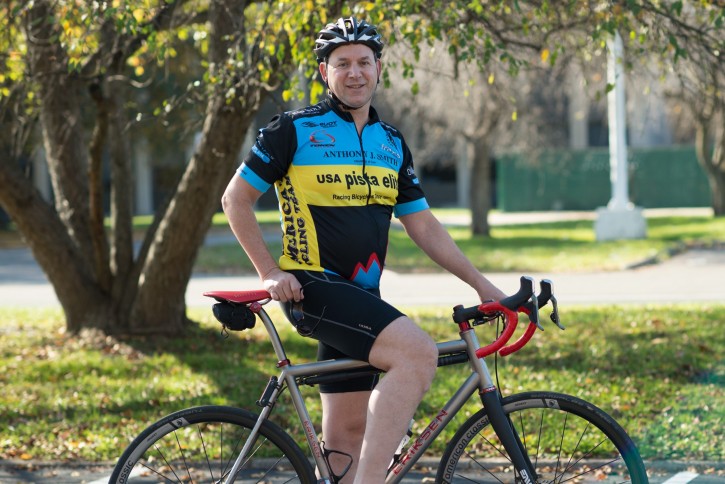
Article originally published Winter 2017 in The Monitor magazine.
Afib patient Jay Truesdell is back in action following cryoablation procedure.
Ever since his very first bike race in 8th grade, Jay Truesdell has loved the exhilaration that comes from his favorite sport – cycling.
So when Jay’s atrial fibrillation (Afib)medication was making it difficult for him to keep up with his fellow cyclists – or get to the top of that next hill – he knew he needed another alternative for treating his condition.
“After my first Afib episode, I was put on a beta blocker, but it suppressed my heart rate,” Jay said. “I was later put on Diltiazem, but it was still suppressing my heart rate, so I stopped taking it. Then I had my third Afib episode.”
For Jay, he knew that choosing not to take his medication was a risky decision. Afib is an irregular heartbeat that can lead to blood clots, stroke, heart failure and other heart-related complications.
With each Afib episode, Jay would feel winded and experience some palpitations, which would last 7-8 hours at a time. When he told FMC cardiologist Dr. Michael Reinig that he had stopped taking his medication, Dr. Reinig suggested Jay consider undergoing a procedure called a cryoablation. The procedure, Dr. Reinig explained, could fix the issue so that Jay no longer had to take medication.
“Since I hadn’t taken my medicine in 8 months, I was ready to at least consider this option,” Jay said.
Dr. Reinig referred Jay to Dr. Maninder Bedi, an electrophysiologist with Fairfield Healthcare Professionals Cardiology who treats patientswith Afib.
At Jay’s first appointment, Dr. Bedi explained how cryoablation works: a balloon is inserted into the heart to where Afib originates. The balloon then freezes the heart tissue, thus restoring normal heart rhythm.
“Jay was an excellent candidate for the procedure since his Afib was paroxysmal (new in onset) and highly symptomatic,” Dr. Reinig said. “He had failed attempted medications and, therefore, cryoabalation was a reasonable next step. Using the cryoabalation balloon procedure, 70-75 percent of patients have complete resolution of their symptoms long-term.”
Jay said the procedure went smoothly; within 24 hours, he was recovering at home and within two weeks, he was back on his bike. He said he hasn’t had any Afib issues since the procedure.
“I was very happy that Dr. Reinig and Dr. Bedi worked with me to find a treatment for my Afib that wouldn’t keep me from the cycling that I enjoy so much,” Jay said.
For more information about Dr. Bedi, Dr. Reinig and cryoablation, call FHP Cardiology at 740-689-4480.
The heart is designed to beat in a steady, regular manner. The beat is controlled by electrical signals that travel through the tissues of your heart. When the heart is “in
Afib,” these signals are disrupted, causing an abnormal heartbeat. When the heart doesn’t beat in rhythm, it does not pump blood properly to deliver the energy and oxygen your body needs.Symptoms of Afib include:
- Fluttering of chest/rapid heartbeat
- Shortness of breath
- Tiring more easily with exercise
- Fatigue
- Dizziness